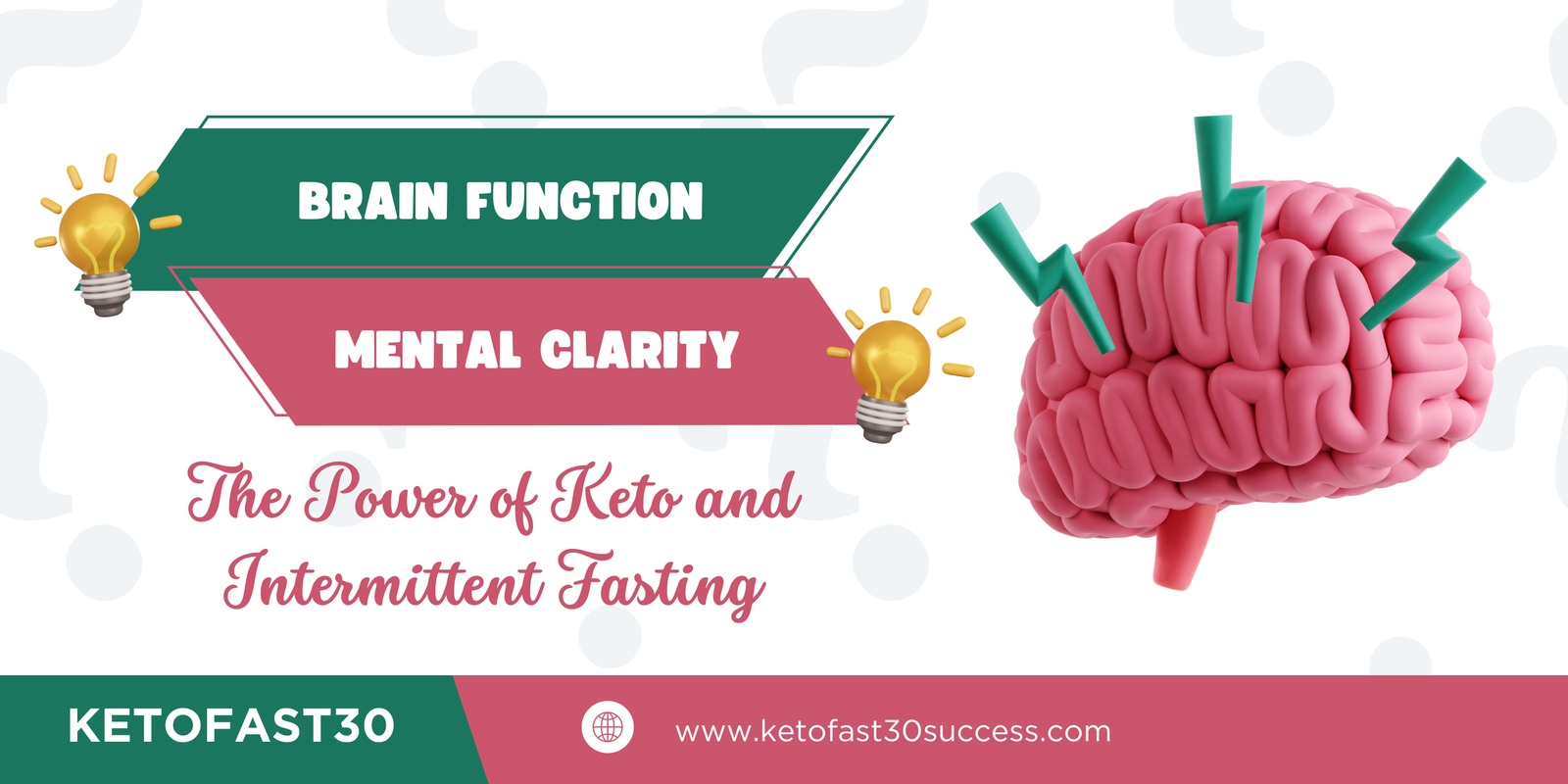Enhanced Brain Function and Mental Clarity: The Power of Keto and Intermittent Fasting. In today’s fast-paced world, maintaining optimal brain function and mental clarity is more important than ever. Interestingly, the ketogenic (keto) diet and intermittent fasting (IF) are not just effective for weight loss and metabolic health; they also offer significant cognitive benefits. Let’s explore how these dietary approaches can enhance brain function and mental clarity.
Understanding Brain Function and Mental Clarity
Brain Function: Refers to the cognitive processes that include memory, attention, problem-solving, and decision-making.
Mental Clarity: The state of having a clear and focused mind, free from confusion or distraction.
How the Keto Diet Enhances Brain Function and Mental Clarity
The keto diet is a high-fat, low-carb diet that shifts your body into a state of ketosis, where it burns fat for fuel instead of carbohydrates. This metabolic change has profound effects on brain health.
- Ketones as Brain Fuel: In ketosis, the liver converts fats into ketones, which serve as an alternative energy source for the brain. Ketones are more efficient than glucose, providing a steady supply of energy that enhances cognitive function.
- Reduced Brain Fog: High-carb diets can lead to blood sugar spikes and crashes, causing brain fog and fatigue. The keto diet stabilizes blood sugar levels, reducing these fluctuations and improving mental clarity.
- Neuroprotective Effects: Ketones have been shown to have neuroprotective properties, potentially reducing the risk of neurodegenerative diseases like Alzheimer’s and Parkinson’s.
- Improved Mitochondrial Function: Ketones support the health and function of mitochondria, the energy powerhouses of cells, including brain cells. This boosts overall brain energy levels and function.
Benefits of Keto for Brain Function:
- Increased and sustained energy for the brain.
- Reduced mental fatigue and brain fog.
- Potential protection against neurodegenerative diseases.
How Intermittent Fasting Enhances Brain Function and Mental Clarity
Intermittent fasting involves alternating periods of eating and fasting. This eating pattern offers several cognitive benefits:
- Boosted Brain-Derived Neurotrophic Factor (BDNF): Fasting increases the production of BDNF, a protein that supports the growth, maintenance, and survival of neurons. Higher BDNF levels are associated with improved memory and learning.
- Enhanced Autophagy: Fasting triggers autophagy, a process where the body cleans out damaged cells and regenerates new ones. This cellular “housekeeping” improves overall brain health and function.
- Reduced Inflammation: Chronic inflammation can impair cognitive function. Fasting reduces inflammation markers, promoting a healthier brain environment.
- Improved Insulin Sensitivity: Stable blood sugar levels from improved insulin sensitivity prevent cognitive decline and protect brain function.
Benefits of Intermittent Fasting for Brain Function:
- Increased production of BDNF.
- Enhanced cellular repair through autophagy.
- Reduced inflammation, promoting a healthier brain.
The Synergy of Keto and Intermittent Fasting
When combined, the keto diet and intermittent fasting offer synergistic benefits that further enhance brain function and mental clarity:
- Accelerated Ketosis: Fasting helps deplete glycogen stores quickly, accelerating the transition into ketosis and maximizing the brain-boosting benefits of ketones.
- Sustained Mental Clarity: With a steady supply of ketones and the cognitive benefits of fasting, you experience sustained mental clarity and focus throughout the day.
- Optimal Brain Environment: Both dietary approaches reduce inflammation and oxidative stress, creating an optimal environment for brain health and cognitive function.
- Improved Mood and Cognitive Performance: The combined effects of stable energy levels, enhanced BDNF production, and improved insulin sensitivity lead to better mood and overall cognitive performance.
Practical Tips for Combining Keto and Intermittent Fasting
- Start Gradually: If you’re new to keto or fasting, start by gradually reducing carbs and extending your fasting window over time.
- Stay Hydrated: Drink plenty of water, herbal teas, and black coffee to stay hydrated and support cognitive functions.
- Prioritize Nutrient-Dense Foods: During eating windows, focus on whole, unprocessed foods rich in healthy fats, moderate protein, and low carbs to nourish your brain.
- Monitor Your Progress: Track your mental clarity and cognitive performance to adjust your diet and fasting patterns as needed.
Fun Facts About Brain Function
- Exercise Your Brain: Just like physical exercise, mental exercises such as puzzles and learning new skills can enhance cognitive function.
- Social Interaction Boosts Brain Health: Engaging in social activities can improve memory and cognitive skills.
- Quality Sleep is Crucial: Sleep is essential for brain health. Aim for 7-9 hours of quality sleep each night to support cognitive functions.
Conclusion
Enhancing brain function and mental clarity is possible with the right dietary strategies. By combining the ketogenic diet with intermittent fasting, you can experience significant cognitive benefits, including increased energy, reduced brain fog, and improved overall brain health. Remember to consult with a healthcare professional before starting any new diet or fasting regimen, especially if you have underlying health conditions.


1 thought on “Enhanced Brain Function and Mental Clarity: The Power of Keto and Intermittent Fasting”